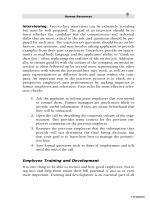Talking about what you are doing at the moment
Bạn đang xem bản rút gọn của tài liệu. Xem và tải ngay bản đầy đủ của tài liệu tại đây (11.79 KB, 1 trang )
Talking about what you are doing at the moment
The present continuous tense is one of the most commonly used tenses in English. It is the tense form that we
use to talk about things we are doing at the moment. Note that this tense is not used to talk about things that
happen all the time – for example, your habits or everyday routines. These ideas are expressed using the simple
present tense.
Uses
Things that are happening at the moment
‘What are you doing there?’ ‘I’m doing my homework.’ (NOT What do you do there?)
She is washing the clothes.
He is learning his lessons.
Compare this with the simple present tense.
He learns his lessons every day. (Here we use the simple present tense because we are talking about his
habits.)
She wakes up early in the morning. (Here again we use the simple present tense because we are talking
about the person’s habits / routines.)
The present continuous tense, on the other hand, is only used to talk about things that we are doing at the
moment of speaking.
The present continuous tense is also used to talk about actions that are happening in a period of time around the
present moment.
I am reading ‘The Old Man and the Sea’ by Earnest Hemingway. (This sentence means that ‘The Old
Man and the Sea’ is the novel I am reading now. It doesn’t necessarily mean that I am reading it at the
moment of speaking.)
He is working hard for his exams.
Future plans and arrangements
The present continuous tense is very commonly used to talk about future plans and arrangements.
I’m doing some shopping tomorrow.
I’m seeing your Dad tomorrow.
I’m not coming with you.
The time expressions commonly used with the present continuous tense are: at the moment, now, today, this
week, this month, tomorrow, and currently. Adverbs of time referring to future (e.g. next week, next month etc.)
can also be used with the present continuous tense.
Stay on top of your writing! Download our grammar guide from www.englishgrammar.org to stay up-to-date.
Powered by TCPDF (www.tcpdf.org)









